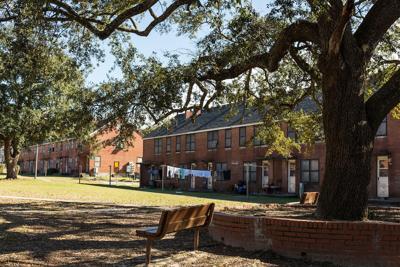Allen Benedict Court has commanded recent attention after two residents were killed by carbon monoxide poisoning there and more than 400 people were evacuated from its apartments. But the 80-year-old complex is just one property that the Columbia Housing Authority presides over. And some are concerned that other areas of public housing will still not get the attention they need, despite the scandal.
“We have a community need to rise behind the residents who have been displaced, but also the bigger community needs more mixed-use affordable housing in the city,” says Columbia City Councilwoman Tameika Isaac Devine.
Columbia Housing Authority attorney Bob Coble, a former mayor of Columbia, says that all of the city’s public housing is old, with many complexes built in the 1940s. He says it’s all been considered for renovation or demolition during his 20 years as mayor and the 10 years since then that he’s worked with the housing authority. There have been a few successes, like the Celia Saxon Homes on Harden Street, which were remodeled in the early 2000s and opened again for residents in 2005, he notes.
But there aren’t any guidelines on how to prioritize which complex to work on next.
“They all look the same and were built around the same time,” Coble says.
He says that the housing authority has always had to prioritize based on the different ways they get funding.
The housing authority gets money from the federal Department of Housing and Urban Development, from its rental properties, and from the city’s general fund, but the proportions depend on what kind of grants they receive from HUD and how much the city allocates. Coble says that the combination does not always come together to allow for any changes.
According to its website, the housing authority manages about 2,200 units in Columbia and Richland County.
Coble says that during the Clinton administration, the housing authority received enough national funding to demolish and rebuild Hendley Homes, a Columbia public housing complex that was originally built in 1952, into a newer, more modern complex called Rosewood Hills. Although the rebuilding was branded a success, it took seven years to complete the project, from 2000 to 2007, and in the meantime, all 300 residents had to find other places to go.
Since then, Gonzales Gardens, a public housing complex near Forest Acres, was torn down in 2016. Those residents, attorney Coble says, received “hundreds of thousands” of dollars’ worth of usage vouchers so residents could either move to another housing authority property or find another living space on their own.
“Not all the people want to or can go back to there, but that’s the plan,” says Coble.
Devine says that the age of Allen Benedict Court meant that it needed renovations but that funding through the U.S. Department of Housing and Urban Development had not come through, so the Columbia Housing Authority had focused on maintenance instead.
In fact, the housing authority learned just this week that it would not be receiving a $30 million grant from the federal Department of Housing and Urban Development to tear down Allen Benedict Court, according to a tweet from Mayor Steve Benjamin.
“@colahousingauth will not receive the @HUDgov Choice Neighborhoods Grant this year,” Columbia Mayor Steve Benjamin tweeted on Saturday. “We must redouble our efforts as a community to redevelop Allen Benedict Court & thousands more units of affordable & workforce housing across the Midlands.”
Coble says that he doesn’t think it would make sense now to try to renovate Allen Benedict Court as it would cost just as much to bring the apartments up to code as it would to demolish the whole place.
The complex has been closed permanently since the incident on Jan. 17 caused an emergency evacuation.
Devine says that although the shelf life of a complex may be coming to an end, the housing authority has limited say on what can be done if the funding is not there. City Council has partnered with the housing authority in the past to bring in city financial support to proactively fix issues, but limited money is not the only obstacle they face.
“We need to be replenishing housing stock so people on the lower end of the income spectrum can have quality, nice, safe spaces to live,” she says.
Devine says that Columbia’s main problem with affordable housing is that there is not enough of it, period. She says the housing authority does the best it can, but with thousands of people on the waiting list even before any issues come up, there isn’t enough room to temporarily house people while updates are made or new complexes are built.
Adam Protheroe, a litigation attorney for South Carolina Appleseed Legal Justice Center, says that the clients he’s had who are in public housing don’t have the resources to find their own solution when they have to be evacuated, whether that’s for an emergency or a planned renovation — and that this is another concern when considering what to do with complexes that need updating or rebuilding.
“A lot of people have their lives planned around their address,” Protheroe says.
And city authorities have no concrete solutions for them yet.
“The reality is, there are no immediate plans for more permanent housing in the city,” Devine says. “Hopefully this tragedy will elevate the conversation that we all as a community need to have.”







